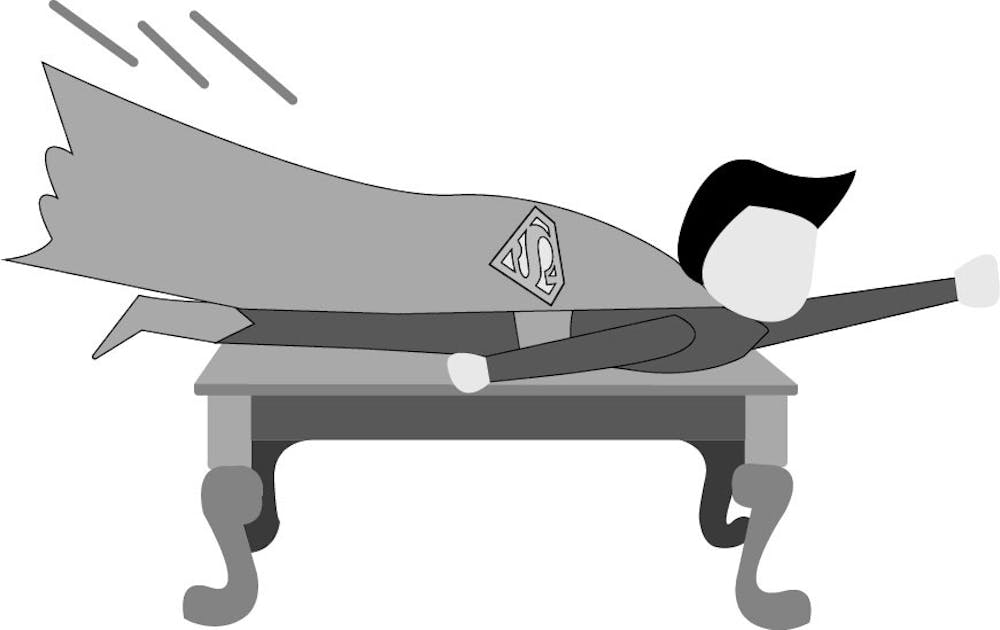
By Austin Lindner | Echo Superman wasn't wearing his cape when I met him at Walmart. He told me he had left it at home. In fact, I almost didn't even notice Superman until I quickly turned the corner of the electronics aisle and stubbed my toe on his battered wheelchair.
"I think I peed a little. Did you pee too?" he asked me, recovering from the surprise with his thin hand clutching at his heart.
I laughed absently as my eyes drifted past the man toward the glowing exit sign. I didn't plan on sticking around to talk to Superman. It was already midnight, and my friends were waiting on me at the car. But I couldn't seem to walk away after mumbling my hurried apology. Because as the light from the demo TVs flickered across his face, Superman told me why he was in a wheelchair now. He told me he was in a battle with cancer, and this time he wasn't going to win.
I don't often meet comic book characters in discount retail stores, but I could tell from the beginning of our conversation that Superman was not your typical hero. While he did peer at me through a pair of old, Clark Kent-esque glasses, he didn't remind me of any protagonist I had seen in the movies. His skinny arms and legs, covered with scaly, blotchy skin, didn't look like they could lift a train off the tracks or knock out a villain, and I doubt that his crooked-but-warm smile had attracted any damsels in distress lately. The Superman I met couldn't fly. He couldn't even walk.
I only discovered that the man in the wheelchair was in fact a superhero when I caught a glimpse of his undershirt, sporting a bright red "S," barely peeking through his rumpled collared shirt. When I commented on it, Superman eagerly showed me the rest of his themed clothing, including his blue Superman socks and pajama bottoms. The attachable Velcro cape was lying on his kitchen table at home, he told me. Without hesitation, Superman pulled down the collar of his undershirt to proudly reveal his true mark of identification, a boldly colored tattoo of the Superman logo covering the left part of his chest, decorating the skin inches above his heart.
But Superman wasn't invincible like his comic book counterpart. When a doctor discovered a mass near his groin during a routine checkup a few years ago, cancer won its first battle over Superman with the surgical removal of his left testicle. The Superman I met understood physical pain and weakness. And he talked about it with a smile stretched tightly across his face.
Between his lighthearted jokes and his comments about his pants finally drying, I learned that, although tough, Superman wasn't untouchable. The man in the wheelchair was vulnerable and raw. His voice shook when he explained to me that the disease had spread beyond his groin, despite his surgery. A reluctant tear slipped from the corner of his dark eyes when he told me that he didn't have much more time. They didn't even know why he was still here.
He smiled stubbornly. "It's because I'm Superman, I told them."
Unfortunately, Superman told me that he is rarely recognized when he leaves the house. Most of the time he is ignored or avoided.
He described how people would stare at him when he first went out in public, weak from his medication and the effects of his disease, turning away sharply if he came closer.
"I used to be in tears every time I went to the store," Superman said, fiddling with the handle on his wheelchair.
Then he learned to turn the painful situation into a joke or an awkward dance, trying to make his reluctant audience laugh.
"You have to have fun in life," Superman told me. "People ask me all the time, 'Who laughs about having cancer? Who does that?'" He lifted his bony thumb and pointed to the faded "S" on his t-shirt. "Me. I do."
I talked to Superman in the electronics aisle for over an hour, choosing to ignore the concerned and frustrated looks from passing store clerks. The store manager came by twice to "make sure everything was all right with us." Both times I emphatically assured him that everything was fine. We were just talking. Both times he nodded slowly, giving me a knowing look before walking away. The third time the manager came back, Superman was asked to leave the building.
The manager didn't give a reason, and the man in the wheelchair didn't ask for one. His passive reaction led me to believe this wasn't the first time he had been kicked out of a store for causing a disturbance. For making people uncomfortable. But before leaving, Superman insisted on hugging me for sticking around to talk to him, and he asked if he could pray for me. He told me to look him up if I ever needed help or just wanted to talk to someone who understands pain. I told him I would, then watched Superman slowly glide toward the exit.
I haven't seen Superman since then. I don't know where he is, or if he's even still around to lay on his kitchen table with his pajama cape and pretend to fly.
But I do know that in the future, I will be checking my surroundings for more superheroes in my own unheroic, everyday life-even in the Walmart electronics aisle.





